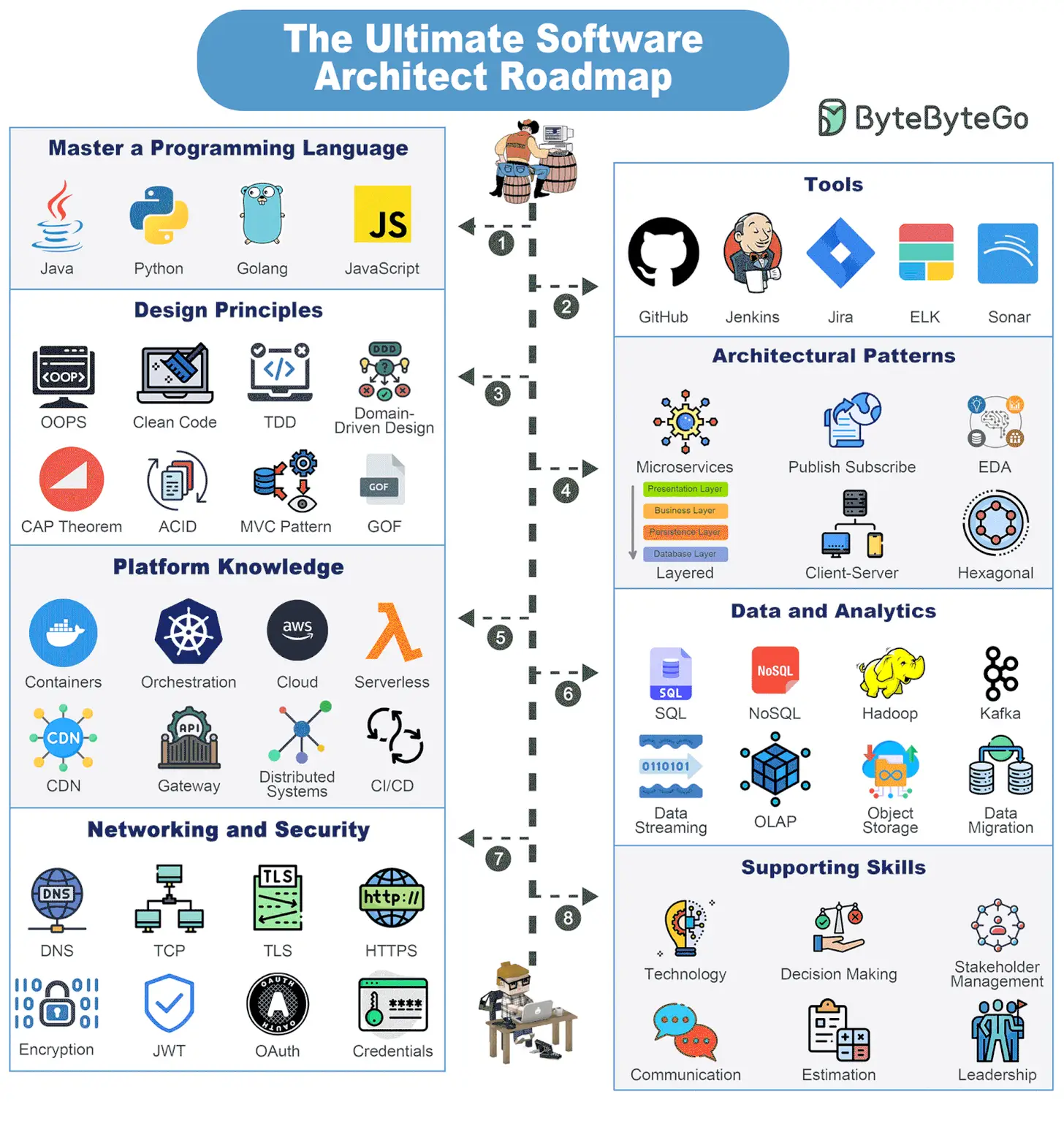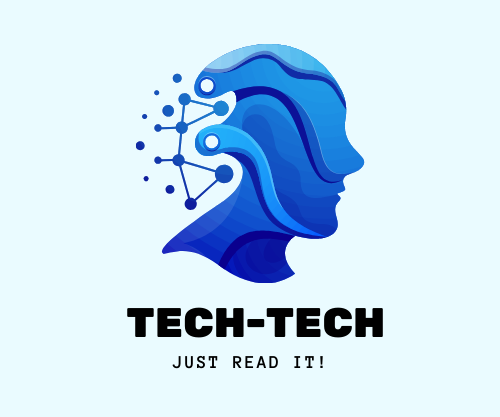Becoming a Software Architect is indeed a continuous learning journey, but here’s a more comprehensive map with some additional skills and knowledge areas to consider. 🚀

1. Master a Programming Language as a Software Architect
Aim to master 1-2 programming languages like Java, Python, Golang, or JavaScript. But don’t stop there—stay curious and explore languages that might challenge your thinking, such as Rust or Scala, which introduce concepts like memory safety or functional programming.
2. Tools
Get hands-on experience with essential tools:
- Version Control: Git (GitHub, GitLab, Bitbucket)
- CI/CD: Jenkins, CircleCI, GitHub Actions
- Monitoring and Logging: ELK Stack (Elasticsearch, Logstash, Kibana), Prometheus, Grafana
- Code Quality: SonarQube, Code Climate
- Issue Tracking and Collaboration: Jira, Confluence, Slack
- Containerization & Orchestration: Docker, Kubernetes
3. Design Principles
Focus on design principles that guide scalable and maintainable solutions:
- Object-Oriented Programming (OOP)
- Clean Code (by Robert C. Martin)
- Test-Driven Development (TDD)
- Domain-Driven Design (DDD)
- SOLID Principles
- CAP Theorem (Consistency, Availability, Partition Tolerance)
- Design Patterns: Gang of Four (GOF) Patterns, MVC, Factory, Singleton
- ACID (Atomicity, Consistency, Isolation, Durability)
4. Architectural Principles
Develop expertise in diverse architectural patterns to handle different business requirements:
- Microservices Architecture
- Monolithic vs. Service-Oriented Architectures (SOA)
- Event-Driven Architecture (using Kafka, RabbitMQ)
- Hexagonal (Ports & Adapters) Architecture
- Layered Architecture
- Publish-Subscribe Pattern
- Serverless and Cloud-Native Architectures
- Event Sourcing and CQRS (Command Query Responsibility Segregation)
5. Platform Knowledge
Gain proficiency in the latest platforms and technologies:
- Cloud Platforms: AWS, Azure, Google Cloud
- Containers & Orchestration: Docker, Kubernetes, Helm
- Serverless Computing: AWS Lambda, Google Cloud Functions
- API Gateways: Kong, AWS API Gateway, NGINX
- Content Delivery Networks (CDNs): Cloudflare, AWS CloudFront
- Distributed Systems fundamentals (consensus algorithms, partitioning, replication)
- CI/CD Pipelines: Automating development workflows
6. Data Analytics
Strengthen your knowledge of data and analytics systems:
- SQL and NoSQL Databases: PostgreSQL, MySQL, Cassandra, MongoDB
- Big Data Tools: Apache Kafka, Hadoop, Apache Spark
- Data Streaming: Kafka, Flink, Pulsar
- Object Storage: Amazon S3, Google Cloud Storage
- Data Warehousing & OLAP: Snowflake, BigQuery, Redshift
- Data Migration Techniques and database scaling strategies
7. Networking and Security
Ensure you’re up-to-date on networking and security best practices:
- Networking Protocols: DNS, TCP/IP, HTTP/HTTPS, WebSockets
- Security Protocols: TLS, SSL, Encryption (AES, RSA)
- OAuth 2.0 and JWT (JSON Web Tokens) for authentication
- API Security: OAuth, OpenID Connect
- Credential Management: Vault, AWS Secrets Manager
- Zero Trust Architectures
8. Cloud Infrastructure and DevOps
Architects are increasingly expected to understand cloud infrastructure and DevOps principles:
- Infrastructure as Code (IaC): Terraform, AWS CloudFormation
- Container Orchestration: Kubernetes, Helm, OpenShift
- Monitoring: Prometheus, Datadog, New Relic
- DevOps Practices: Continuous Integration and Delivery (CI/CD), Infrastructure Automation
9. Supporting Skills
In addition to technical knowledge, you’ll need soft skills to be a successful architect:
- Decision-Making: Balance trade-offs between performance, scalability, and cost.
- Stakeholder Management: Align technical goals with business priorities.
- Communication Skills: Convey complex ideas to technical and non-technical audiences.
- Leadership: Mentor junior developers and lead cross-functional teams.
- Project Estimation: Assess timelines, resources, and potential risks effectively.
10. Emerging Trends & Technologies
To future-proof your career, stay informed about emerging technologies and trends:
- Artificial Intelligence (AI) & Machine Learning (ML): Integrating ML models into applications.
- Blockchain: Understanding decentralized systems and smart contracts.
- Edge Computing: Architecting systems closer to where data is produced.
- Quantum Computing: Keep an eye on this for future scalability challenges.
- Web3 & Decentralized Applications (dApps): The future of internet architecture.
What Else Would You Add?
- Business Acumen: Understanding the business side of technology decisions can set you apart.
- Ethical AI & Technology: Incorporating ethical considerations into system design.
This roadmap ensures that you’re not just a great coder but a well-rounded architect who can design complex systems, mentor teams, and drive business success!

Ahmed S.
October 9, 2024Thank you for sharing.